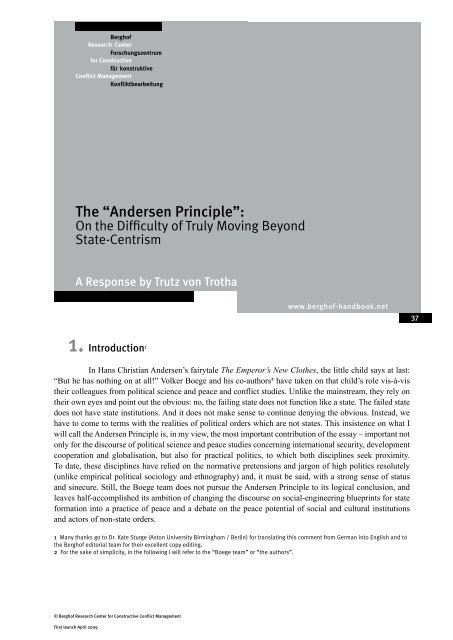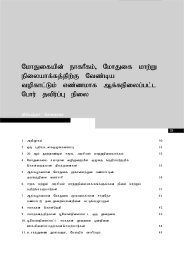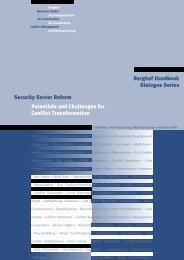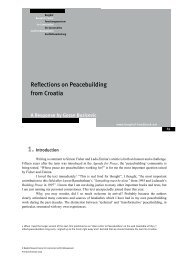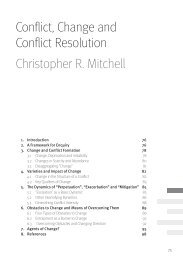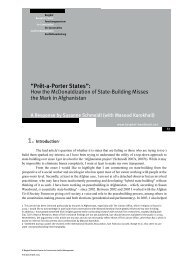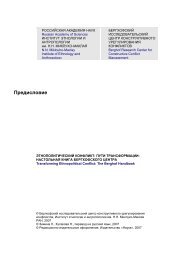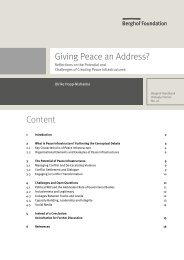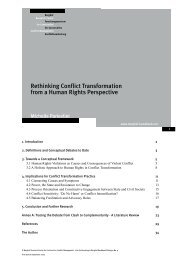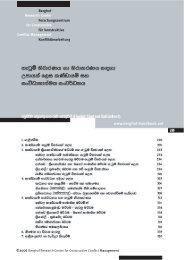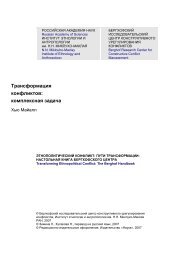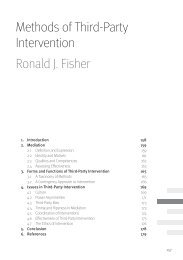Andersen Principle - Berghof Handbook for Conflict Transformation
Andersen Principle - Berghof Handbook for Conflict Transformation
Andersen Principle - Berghof Handbook for Conflict Transformation
Create successful ePaper yourself
Turn your PDF publications into a flip-book with our unique Google optimized e-Paper software.
The “<strong>Andersen</strong> <strong>Principle</strong>”:<br />
On the Difficulty of Truly Moving Beyond<br />
State-Centrism<br />
A Response by Trutz von Trotha<br />
1. Introduction 1<br />
In Hans Christian <strong>Andersen</strong>’s fairytale The Emperor’s New Clothes, the little child says at last:<br />
“But he has nothing on at all!” Volker Boege and his co-authors 2 have taken on that child’s role vis-à-vis<br />
their colleagues from political science and peace and conflict studies. Unlike the mainstream, they rely on<br />
their own eyes and point out the obvious: no, the failing state does not function like a state. The failed state<br />
does not have state institutions. And it does not make sense to continue denying the obvious. Instead, we<br />
have to come to terms with the realities of political orders which are not states. This insistence on what I<br />
will call the <strong>Andersen</strong> <strong>Principle</strong> is, in my view, the most important contribution of the essay – important not<br />
only <strong>for</strong> the discourse of political science and peace studies concerning international security, development<br />
cooperation and globalisation, but also <strong>for</strong> practical politics, to which both disciplines seek proximity.<br />
To date, these disciplines have relied on the normative pretensions and jargon of high politics resolutely<br />
(unlike empirical political sociology and ethnography) and, it must be said, with a strong sense of status<br />
and sinecure. Still, the Boege team does not pursue the <strong>Andersen</strong> <strong>Principle</strong> to its logical conclusion, and<br />
leaves half-accomplished its ambition of changing the discourse on social-engineering blueprints <strong>for</strong> state<br />
<strong>for</strong>mation into a practice of peace and a debate on the peace potential of social and cultural institutions<br />
and actors of non-state orders.<br />
1 Many thanks go to Dr. Kate Sturge (Aston University Birmingham / Berlin) <strong>for</strong> translating this comment from German into English and to<br />
the <strong>Berghof</strong> editorial team <strong>for</strong> their excellent copy editing.<br />
2 For the sake of simplicity, in the following I will refer to the “Boege team” or “the authors”.<br />
© <strong>Berghof</strong> Research Center <strong>for</strong> Constructive <strong>Conflict</strong> Management<br />
First launch April 2009<br />
www.berghof-handbook.net<br />
37
Trutz von Trotha<br />
2. State-Centrism and the Failed Denial of Non-State Political Orders<br />
Right up to the present day, political science, its sub-discipline peace studies and practical<br />
politics have found it difficult to reconcile themselves to what is empirically obvious. Their statecentrism<br />
has seemed insurmountable. In the course of the not particularly civilised “civilising<br />
process”, the state has become ‘second nature’ <strong>for</strong> the western – and not only the western – world,<br />
even though this <strong>for</strong>m of political rule is anything but the historical norm. Many legacies converge<br />
in this state-centrism, not least colonialism, which tried to realize the utopia of modern state rule<br />
in the colonies and thereby globalised that utopia. As such a globalised utopia, one-dimensional<br />
thinking within the categories of statehood has even outlived decolonisation. The juridical features<br />
of statehood have remained the touchstone <strong>for</strong> participation in international relationships.<br />
The Boege team reveals the bankruptcy of state-centrism in political science, peace<br />
studies and practical politics. This step is first of all a public affirmation of a sober sense of reality.<br />
It is a confirmation that the paramount and still most difficult task of scholarly endeavour is an<br />
empirical and analytical one. ‘Theory’, that <strong>for</strong>midable enterprise, becomes no less <strong>for</strong>midable when<br />
it offers analytical access to the world as it is. Yet, following the Platonic tradition, political science<br />
and peace studies have never been satisfied with empirical study – quite apart from the fact that it is<br />
probably considerably easier to draw up a “civilisational hexagon” (Senghaas 2004a, 17 ff.; 1996,<br />
30 ff., 124 ff.) 3 that summarises the quintessence of constitutional developments in democracy and<br />
the rule of law since the bourgeois revolutions, and to make this one of the many similar ‘templates’<br />
<strong>for</strong> what ‘development’ ought to look like. At the Davos <strong>for</strong>ums of this world, and in the political<br />
science and peace studies mainstream, we do not even find an attempt to offer the impressive<br />
theoretical elegance of a Dieter Senghaas; instead, as the authors remind us, the OECD state model is<br />
proclaimed the optimum route to sustainable development and internal peace without further ado.<br />
If the counterfactual normativity of state-centrism can now no longer be maintained, this<br />
is due to a range of developments whose consequences had become clearly discernible by the end<br />
of the Cold War. While the “end of history” was being declared in a self-aggrandising, imperial<br />
discursive gesture, it was discovered that in not a few regions of the world, like Sudan or Sri<br />
Lanka, “small”, “new”, “asymmetrical” wars, or however else they were labelled, had been raging<br />
<strong>for</strong> decades. Sierra Leone was becoming a gangland ruled by warlords. In Rwanda, within around<br />
ten weeks hundreds of thousands of Tutsis and people thought to be Tutsi or suspected of helping<br />
Tutsis were murdered, and the murderers carried out their horrific task with machetes as if it were<br />
part of their usual daily work in the fields (Brandstetter 2007). In the DR Congo, what has now<br />
become known as the ‘African World War’ was unfolding. But just as charity begins at home, the<br />
west’s view of itself was most deeply affected by the ‘Yugoslav war’, which brought state collapse<br />
to European shores and continues to the present day in Kosovo, and by the American experience<br />
in Somalia – where, in October 1993, the military operation ‘Continue Hope’ (a name apparently<br />
chosen personally by the USA’s vision of itself) ended with dead American soldiers being dragged<br />
through the streets of Mogadishu, the Americans retreating from Somalia in disarray and images of<br />
the events racing around the world. 4<br />
3 See also Dieter Senghaas’ article in the <strong>Berghof</strong> <strong>Handbook</strong> <strong>for</strong> <strong>Conflict</strong> Trans<strong>for</strong>mation (Senghaas 2004b).<br />
4 It is probable that the American humiliation in Somalia contributed to the USA’s Security Council veto of an effective UN<br />
intervention in Rwanda (Dallaire 2003).<br />
© <strong>Berghof</strong> Research Center <strong>for</strong> Constructive <strong>Conflict</strong> Management<br />
The “<strong>Andersen</strong> Prinicple”<br />
38
Trutz von Trotha<br />
3. The Surreal Nature of Engineering State-Building<br />
Faced with these experiences, politics underwent a momentous shift: in place of the<br />
fiction of statehood, it took upon itself the task of establishing state orders in regions afflicted by<br />
wars and other <strong>for</strong>ms of severe instability within the state, regions that thus – and under the premises<br />
of the so-called “war on terrorism” – come to be perceived as threats to international or even national<br />
security. Under the banner of “civil crisis prevention, conflict resolution and the consolidation of<br />
peace” (my translation of the German government’s May 2004 action plan 5 ), deployments that are<br />
heavy on personnel and resources, and potentially life-threatening <strong>for</strong> soldiers, have aimed to bring<br />
about democratic states and the rule of law on a more or less western model. Exemplary here are<br />
the deployments in Kosovo, Afghanistan and Iraq. This shift in policy was attended and fuelled by a<br />
political science, and representatives of its nearest neighbouring disciplines, that had now discovered<br />
the ‘failing’ and ‘failed’ state. Instead of proclaiming the end of history, they recommended (and<br />
still do) “learning to do state-building better”, because ultimately the future of the world order<br />
depended upon it (Fukuyama 2004, 120, as cited in the lead article). This is exemplified in the<br />
German context by the memorandum on rethinking Germany’s Africa policy (“Memorandum zur<br />
Neubegründung der deutschen Afrikapolitik”, Engel et al. 2000) and the critique of reconstruction<br />
policy in Afghanistan (Wimmer/Schetter 2002). What the Africanists’ opaque sociological jargon<br />
had named ‘structural stability’, the critics of the reconstruction policy in Afghanistan – with at<br />
least the virtue of being straight to the point – called a “state-centred” strategy which had to be<br />
pursued (ibid., 9). The ‘fiction of statehood’ had been abandoned. But the state-centrism of political<br />
action remained unaltered – and indeed, with the declining appeal of neoliberalism <strong>for</strong> development<br />
cooperation and <strong>for</strong> the internal configuration of the state, is beginning to attract renewed attention<br />
in continental Europe and beyond.<br />
Once again the authors’ strong sense of reality is indicated by the fact that they dismiss the<br />
hackneyed precepts of a state-centred strategy in international relations and development cooperation.<br />
They rightly point out how “inherently violent”, unpredictable, protracted and convoluted the process<br />
of state <strong>for</strong>mation actually is, and, again an important point to make, how high its social cost may be<br />
from the perspective of the ‘citizens’. There is one thing, though, that the Boege team in my view<br />
does not emphasize strongly enough: the idea of learning to do state-building and implementing<br />
it in a planned fashion is such a ludicrous notion that it ought to prompt serious concern over a<br />
political mainstream and an academic discipline which allows itself such surreal historical amnesia.<br />
Implementing state rule is the most radical and ambitious exercise of power, because it leaves barely<br />
a single building block of non-state political orders unaffected, including those of centralized nonstate<br />
systems of power. If one considers how complex the preconditions of state rule are – not to<br />
mention the modern constitutional rule of law, let alone the welfare state – it becomes clear why<br />
successful state-building is a thoroughly ‘non-obvious’ affair, 6 kindling more or less all the serious<br />
conflicts with which human beings can confront each other. Accordingly, in many places it has been<br />
and remains above all a concatenation of failures. Commands fade unheard. Institutions of central<br />
authority fail to take root, or decay just like the shoddy or magnificent edifices designed to house the<br />
functionaries doing their duty in the cause of state rule. The grass grows high over the transportation<br />
links between local authorities and the capital, and the bridges destroyed by the annual snowmelt<br />
remain unrepaired, because local officials lack both the material and the human resources to rebuild<br />
5 Available (in German) online at www.auswaertiges-amt.de/diplo/de/Aussenpolitik/Themen/Krisenpraevention/neu/<br />
Ueberblick.html. [For the English version, replace /de/ by /en/ in previous link.]<br />
6 On the concept of the ‘non-obviousness’ (Unselbstverständlichkeit) of state rule, see Trotha 1994a, 1 ff.<br />
© <strong>Berghof</strong> Research Center <strong>for</strong> Constructive <strong>Conflict</strong> Management<br />
The “<strong>Andersen</strong> Prinicple”<br />
39
Trutz von Trotha<br />
them. Worse, if those being ruled initiate open, violent resistance against the state’s claim to rule over<br />
them, the door is opened wide <strong>for</strong> entanglement in a spiral of escalating violence. The idea that one<br />
could ‘learn’ state-building and then, so to speak, after passing one’s exams would be ready to put<br />
what one has learned into effective practice signals an extensive loss of political and administrative<br />
elites’ grasp on reality, as well as that of their aides in the universities and think-tanks – a loss that<br />
is proportionate to the spread and arrogant expansionism of the managerial, administrative sense of<br />
feasibility and control.<br />
4. The Colonial State as a Failing State<br />
Like so many others be<strong>for</strong>e them, the authors assert that the emergence of the European<br />
state took centuries, whereas the postcolonial state resulted from the relatively short-notice delivery<br />
of a product exported from Europe in the period of decolonisation. In the overall context of the lead<br />
article, this is a marginal note, but it in turn requires an annotation, since it propagates a cliché that<br />
is anything but marginal.<br />
Let me recall here Eugen Weber’s (1979) influential study. In it, he argues that France,<br />
continental Europe’s prime example of statehood, became a modern state – and made “peasants<br />
into Frenchmen” – only during the first half of the nineteenth century. This is an initial reservation<br />
which relativises the opposition of the west and the postcolonial world along the temporal dimension<br />
of state <strong>for</strong>mation. However, the reservation acquires greater weight if we remember that when<br />
calculating the timescale of state <strong>for</strong>mation, the colonial period itself must also be added to the<br />
balance. Accordingly, sub-Saharan Africa, <strong>for</strong> example, can look back on a state-building process<br />
that has taken not around sixty but around 120 years, approximating the time span between the<br />
French Revolution and the First World War. The authors support what I call the ‘African strategy’:<br />
making globalisation, the non-African world and especially the <strong>for</strong>mer colonial rulers responsible<br />
<strong>for</strong> the loss of statehood (albeit colonial statehood) that was experienced by many postcolonies.<br />
Yet on the contrary, the foundering of statehood in numerous postcolonial nations commences with<br />
the colonial state itself – and the authors themselves hint at as much in many apposite comments<br />
on the colonial state. The fact that more than a few colonial states were ‘weak’ and increasingly<br />
‘failing’ states was conditioned by the “colonial situation” in Georges Balandier’s (1982) sense, i.e.<br />
a monopoly on violence that reached only minimally into the internal relations of the subjugated<br />
communities, an administration whose bureaucratic and direct administrative agency was overlaid<br />
with, if not supplanted by, despotic and intermediary action, and a virtually complete lack of the<br />
basic legitimacy of cultural affiliation (Trotha 1994b). In other words, the history of the failing and<br />
failed state is also the history of colonial states, which did not succeed in overcoming the immense<br />
obstacles posed by the wealth of preconditions required <strong>for</strong> the modern state. The colonial stateconstructors<br />
felt the cold wind of the non-obviousness of state rule. In many places, especially in<br />
sub-Saharan Africa, they did not succeed in effectively protecting themselves from it.<br />
This failure of the colonial state, moreover, includes an experience that should act as<br />
a warning to the increasingly apparent colonialism of pacification and democratisation to which<br />
state-building military interventions mutate nowadays in the course of their occupations. A failure<br />
of state-building is predictable under two key conditions. One of these is radically exogenous<br />
state-building, that is, through conquerors who are alien in every respect 7 – all the more so if these<br />
7 At this point I will not further discuss the complex problem that state <strong>for</strong>mation in the historically ‘normal’ case is exogenous<br />
to the extent that the elite agents of state <strong>for</strong>mation must first of all subjugate those, in particular the mass of the peasant<br />
population, who may one day succeed in becoming self-confident ‘citizens’ or at least, as the German tradition has it, ‘citizens of<br />
© <strong>Berghof</strong> Research Center <strong>for</strong> Constructive <strong>Conflict</strong> Management<br />
The “<strong>Andersen</strong> Prinicple”<br />
40
Trutz von Trotha<br />
conquerors have, like those in the current pacification deployments, made it their credo to end the<br />
occupation as soon as possible. Successful state <strong>for</strong>mation is a chiefly internal trans<strong>for</strong>mation of<br />
societal orders, one which, of course, takes place in the context of competing political orders and<br />
which in Europe, at least, took the <strong>for</strong>m of “elimination contests” which were typically violent in<br />
nature. This, certainly, is how Norbert Elias (1969) describes the warlike and bloody process by<br />
which the modern state emerged. Part of the power of Elias’s theory is that it names the indissoluble<br />
connection between political and societal trans<strong>for</strong>mation and the psychological reorganisation of<br />
the person as preconditions of a modern society under state rule. Only the interdependence of these<br />
three fundamental trans<strong>for</strong>mations makes stable statehood possible, underlining once again the<br />
radical non-obviousness of a successful process of state <strong>for</strong>mation. Not least on the basis of these<br />
prerequisites <strong>for</strong> the state comes the second condition of likely failure, as the Boege team correctly<br />
observes: state-building that is faced with nations which have no history of successful statehood.<br />
This was the norm in sub-Saharan Africa.<br />
5. From the Concept of the Failed State to the Concept of Hybrid<br />
Political Orders<br />
The concept of the failed state, with its various degrees of failure, exists in two variants.<br />
One of these, and the one from which the Boege team most clearly dissociates itself, is what I call<br />
the “institutionalist variant”. Its view of the state is narrowed even beyond the analytical notion of<br />
the state in Max Weber’s sense. It regards the OECD model of the strong state and democratic rule<br />
of law as the yardstick by which to measure statehood. Its criteria are specific institutions such as<br />
general and fair elections guaranteeing secrecy; parliaments; parties; independent judiciaries; and<br />
human rights. It might also be called the model of “triple non-obviousness”, since it adds to Max<br />
Weber’s state the Enlightenment model with its aspects of democracy and rule of law and – at least<br />
in a rudimentary <strong>for</strong>m – the interventionist model adopted by, <strong>for</strong> example, the welfare state.<br />
As the authors’ presentation of Ghani et al.’s (2005, 2006a, 2006b) concept of the state<br />
makes clear, this model is not always easy to separate from the second variant, which I call the<br />
“functionalist” one. Here, a political order is not measured by the presence and modus operandi<br />
of specific institutions, but by the fulfilment of functions which the modern western state typically<br />
delivers. State-centrism here is indirect, a kind of ‘second-order’ state-centrism, because the<br />
achievements of non-state political orders are measured against (and research criteria are orientated<br />
towards) the functions of the modern state. 8 This model is no less normative than the institutionalist<br />
one, and neither theoretical variant has anything in common with the brilliant analyses of state<br />
<strong>for</strong>mation made by Bertrand de Jouvenel (1969) and Charles Tilly (1990, 1986). For the latter the<br />
beginnings of the state are to be found in brigandage, organised crime and racketeering.<br />
Boege and his colleagues refute both variants of state-centrism in the debate on failed<br />
states. They are seeking to persuade political science and peace and conflict studies to join a voyage<br />
of discovery that will lead once and <strong>for</strong> all away from the institutional and functionalist ‘obviousness’<br />
of state-centred thinking (and, as I would add, feeling), and towards the diversity of those political<br />
orders that they gather under the heading of “hybrid political orders”. However, in my opinion these<br />
ef<strong>for</strong>ts do not go far enough.<br />
the state’ (Staatsbürger). The classical distinction between exogenous and endogenous state <strong>for</strong>mation is hence a relative one.<br />
8 This variant of state-centrism is exemplified by the theoretical basis of Research Centre (SFB) 700 of the German Research<br />
Foundation, investigating “Governance in Areas of Limited Statehood” (Risse/Lehmkuhl 2007).<br />
© <strong>Berghof</strong> Research Center <strong>for</strong> Constructive <strong>Conflict</strong> Management<br />
The “<strong>Andersen</strong> Prinicple”<br />
41
Trutz von Trotha<br />
The concept of hybrid political orders responds to the circumstance that the regions<br />
of fragile, failing and failed states accommodate political orders of great heterogeneity and nonsynchronicity;<br />
that they lack a state monopoly on violence and, equally, encounter divergent claims<br />
to authority and legitimacy; that ‘traditional’ and ‘modern’ institutions co-exist, ensure order and<br />
compete <strong>for</strong> ordering functions – in short, that the regions of fragile states are marked by a principle<br />
that has been proclaimed ‘postmodern’, namely hybridisation (Journal of American Folklore 1999).<br />
This concept is intended to highlight the diversity of non-state orders, to focus on the connections<br />
between elements of the political order that have very different societal origins and follow very<br />
different logics, and to draw attention to the fact that the different components of a political order<br />
do not exist in isolation but refer to one another, entering into a great variety of interpenetrative<br />
relationships.<br />
So far, so good – in the context of tenacious state-centrism all the more so because the<br />
concept aims <strong>for</strong> a fundamental shift in perspective: away from the fixation on state institutions<br />
and functions, and towards the search <strong>for</strong> non-state actors and institutions which make important<br />
contributions to shaping the political order.<br />
However, it must be asked whether the postmodern word-coinage is really necessary.<br />
Hybridity is not a peculiarity of the postcolonial order or indeed of postmodernity. It appears with the<br />
historicity of social orders itself, as should have become clear after the discussion of the historicity<br />
of the “people without history” (Wolf 1986) and the “invention of tradition” (Hobsbawm/Ranger<br />
1983). Admittedly, this objection could be countered by saying that we are talking about degrees<br />
of hybridisation, and that the present day’s hybrid political orders represent the opposite end of the<br />
spectrum to the weak hybridity of, <strong>for</strong> example, a ‘traditional’ society. But in this counterargument<br />
it becomes evident that the concept of a hybrid political order is actually intended as a ‘sensitising<br />
concept’ in the sense used by Herbert Blumer (1954) and Norman Denzin (1989). As such, it marks<br />
a beginning, even though, on the one hand, it competes with even more general yet less ambiguous<br />
terms like “non-state orders” and, on the other, falls behind what is in many respects the greater<br />
precision of concepts like “quasi-statehood” (Hahn 2006) or “para-statehood” (Klute/Trotha 2004;<br />
Trotha 2004) – concepts, to be sure, which are more limited in analytical scope right from the outset.<br />
At the same time, I would argue that ‘hybrid political order’ is conceived of in too static a way. It<br />
fails to sufficiently highlight the dynamism of hybridity, just as it downplays the dynamics, interests,<br />
conflicts and power struggles of those customary non-state institutions and actors (Klute et al. 2008)<br />
which the ‘failed state’ model regards as being the obstacles to modern statehood and the enemies<br />
of successful state-building – and which the Boege team would, in turn, like to see taking centre<br />
stage.<br />
But while all these modified objections have their place within a narrow academic<br />
discussion of the theory and research of hybrid political orders, they are peripheral from the point<br />
of view of the ambition the authors are pursuing: to integrate traditional and local institutions,<br />
processes and actors into a practice of state <strong>for</strong>mation. For this practical objective, they seem<br />
willing to sacrifice the <strong>Andersen</strong> <strong>Principle</strong> which they have just used to argue so vehemently and<br />
persuasively against state-centred concepts of the failed state. As a result, they remain silent on the<br />
price that non-statehood makes us pay <strong>for</strong> applying the <strong>Andersen</strong> <strong>Principle</strong>.<br />
© <strong>Berghof</strong> Research Center <strong>for</strong> Constructive <strong>Conflict</strong> Management<br />
The “<strong>Andersen</strong> Prinicple”<br />
42
Trutz von Trotha<br />
6. Somaliland, the <strong>Andersen</strong> <strong>Principle</strong> and the Price of Peace<br />
The authors write: “the Somaliland and Bougainville cases demonstrate that new <strong>for</strong>ms of<br />
‘state-building’ […] can have positive results” (Boege et al. in this volume, 28). I will restrict myself<br />
to commenting on the case of Somaliland, which the Boege team presents in detail. What does that<br />
case actually demonstrate?<br />
There is a clue in the fact that the authors place the word ‘state-building’ in quotation<br />
marks. For Somaliland is not a case that can document the success of state-building according to<br />
the authors’ ideas. Somaliland is a considerable success and a demonstration of several relevant<br />
insights. For one thing, it proves that there are ways out of the violent collapse of states, ways which<br />
lie beyond the state and in the mobilization of customary institutions and procedures. Crucially, and<br />
contrary to the cliché of the rigidity of tradition and customary ‘premodern’ institutions (a cliché<br />
that cannot be corrected within the western tradition of emancipation and progress), in Somaliland<br />
these institutions and procedures have proved to be extremely flexible and adaptable. While the state<br />
collapsed, the segmentary order has endured through all the storms of history, in ever new variations,<br />
by ‘modernising’ itself again and again. I call this kind of continuity “supple transcontinuity”.<br />
Somaliland is, as well, a demonstration of how there is a central role <strong>for</strong> the local neo-traditional<br />
authorities among the actors of peace-seeking and consolidation. But there is one thing Somaliland<br />
certainly is not, and that is an example of state-building – or only if we use the word in the context<br />
of a state-centrist debate, metaphorically and ironically, as the quotation marks are presumably<br />
intended to indicate.<br />
Somaliland is a segmentary order in etatist clothing. Somaliland reverses, so to speak,<br />
the story of The Emperor’s New Clothes. It has clothes on, and those clothes fulfil precisely the<br />
task that is intended <strong>for</strong> them: they are cut according to the conventions of taste, namely to satisfy<br />
the strict rulebook of international law and international relations, in which states are the dominant<br />
actors, and to veil what this rulebook insists must not be revealed, namely a segmentary order. One<br />
of Somaliland’s most challenging features is that it has no monopoly on the means of violence 9 and<br />
that the path to peace was not accompanied by disarmament of the population – thus remaining, as<br />
in all segmentary orders, permanently precarious. Why, then, should we speak of a process of statebuilding<br />
where there is no state? It is pointless to speculate – perhaps the answer lies in the authors’<br />
desire to search <strong>for</strong> middle ground in the discourse on state-building. The important point is that<br />
here they abandon the <strong>Andersen</strong> <strong>Principle</strong> and, just like at the end of the story of The Emperor’s New<br />
Clothes, align themselves with the crowd of chamberlains who “walked with still greater dignity, as<br />
if they carried the train which did not exist”.<br />
Somaliland is provocative because it is a segmentary order, and as a segmentary order in<br />
the garb of the modern state it claims the status of an actor in international relations and international<br />
law. This means nothing less than that the juridical and political foundations of the ‘Westphalian<br />
order’ no longer hold, and that international relations must be placed on new foundations. The<br />
challenge that seems to be posed by the twenty-first century is to continue the process which<br />
began in the context of war, when additional protocols extended the protection of the Geneva<br />
Convention beyond the circle of soldiers to combatants in civil war conflicts – that is, to non-state<br />
actors. International politics has an analogous task. It must find institutions, procedures and legal<br />
systems which are orientated on actors’ ability to ensure peace and order, not exclusively on their<br />
statehood. This is what the Boege team reports regarding Somaliland, and what defines the heart of<br />
9 The same is true <strong>for</strong> Papua New Guinea, of which Bougainville is part.<br />
© <strong>Berghof</strong> Research Center <strong>for</strong> Constructive <strong>Conflict</strong> Management<br />
The “<strong>Andersen</strong> Prinicple”<br />
43
Trutz von Trotha<br />
its peace-policy ambitions. However, the authors risk muddying the discourse and praxis around the<br />
integration of non-state actors in the <strong>for</strong>mation of orders of peace by disguising this integration as a<br />
process of state-building. After all, the issue is no longer the state alone, which has probably passed<br />
the zenith of its expansion. It is, rather, the acknowledgement that non-state orders too (or rather, in<br />
view of the long history of non-statehood: especially non-state orders) hold a substantial potential<br />
<strong>for</strong> peace and order that we cannot continue to ignore. Applying the <strong>Andersen</strong> <strong>Principle</strong> consistently<br />
would mean replacing the principle of state-building with the principle of peacebuilding.<br />
That has, of course, its price. I imagine that it is this price, among other things, which<br />
makes it so difficult in western democratic welfare states, especially among the political elites, to find<br />
legitimation <strong>for</strong> non-state-centred politics, and which recurs in the harmonising tone of the authors’<br />
representation of non-state institutions and procedures. The price is made up of, on the one hand, the<br />
fact that the principle of peacebuilding by means of non-state orders follows a principle analogous<br />
to the Westphalian order’s principle of non-intervention: to achieve peace, also those social and<br />
cultural orders and procedures of non-state actors must be accepted which do not seamlessly match<br />
the universalist claims of human rights and emancipation. Somaliland is undoubtedly not a country<br />
of human-rights individualism or unrestricted press freedom, nor one of gender mainstreaming.<br />
The history of human rights and social emancipation is a history of statehood – statehood which<br />
has been assertive to an unprecedented degree – and, of course, equally a history of the appalling<br />
violation of human rights and the suppression of emancipatory movements; something exemplified<br />
by the last century with its fascisms and totalitarianisms. Minorities need a central authority capable<br />
of asserting itself if they are to achieve their claims to recognition and emancipation. The end of the<br />
state, and a peace policy on the basis of non-state orders, makes life considerably more difficult <strong>for</strong><br />
such minority and emancipatory claims.<br />
What is even more problematic is that peacebuilding by means of non-state orders has<br />
to be paid <strong>for</strong> by curtailments in the reliability of that peace. Somaliland shows quite plainly that<br />
the consolidation of peace in non-state orders takes time and places huge demands on the patience<br />
of those concerned. Follow-up and re-negotiations are the rule rather than the exception. The large<br />
number of powerful and power-conscious local actors makes it necessary to put in place not a<br />
peace treaty but ‘omnibus treaties’ with local rulers and groups of differing degrees of influence.<br />
Concluding peace with one party does not automatically mean the acceptance of the peace treaty by<br />
another party. In fact, the peace treaty of the now widely accepted type loses its significance. It is<br />
replaced by a plethora of small-scale agreements with more or less influential coalitions of actors. In<br />
contrast to western notions of law, moreover, peace accords are only temporary agreements, which<br />
there<strong>for</strong>e remain as precarious as the peace in segmentary orders. Reliable guarantees of lasting<br />
peace do not exist in non-state orders. Unlike in state orders with a legitimate monopoly on violence,<br />
the non-state order remains in the shadow of violent self-help and of the relative political autonomy<br />
of social units, whether those be segments, ‘age sets’ or ‘big men’ (Godelier/Strathern 1991; Trotha<br />
1986). We must use the <strong>Andersen</strong> <strong>Principle</strong> and the principle of peacebuilding to learn how to deal<br />
with such insecurity and lack of reliability – though this should at least be made easier by the fact<br />
that the principle of denial and refutation of non-statehood, as pursued by state-centred politics <strong>for</strong><br />
decades, has failed miserably in many parts of the world.<br />
© <strong>Berghof</strong> Research Center <strong>for</strong> Constructive <strong>Conflict</strong> Management<br />
The “<strong>Andersen</strong> Prinicple”<br />
44
Trutz von Trotha<br />
7. References and Further Reading<br />
Balandier, Georges 1982. La Notion de ‘Situation Coloniale’, in: Georges Balandier. Sociologie Actuelle de<br />
l’Afrique Noire. Dynamique Sociale en Afrique Centrale. Paris: Presses Universitaires de France,<br />
3-38. (First published in 1952.)<br />
Blumer, Herbert 1954. What is Wrong with Social Theory?, in: American Sociological Review, 19, 3-10.<br />
Boege, Volker, Anne Brown, Kevin Clements and Anna Nolan 2009. On Hybrid Political Orders and Emerging<br />
States: What is Failing – States in the Global South or Research and Politics in the West? in: Martina<br />
Fischer and Beatrix Schmelzle (eds.). Building Peace in the Absence of States: Challenging the<br />
Discourse on State Failure. (<strong>Berghof</strong> <strong>Handbook</strong> Dialogue No. 8.) Berlin: <strong>Berghof</strong> Research Center,<br />
15-35. Available at www.berghof-handbook.net/std_page.php?LANG=e&id=5.<br />
Brandstetter, Anna-Maria 2007. “Das ‘Fallen der Kirschblüten’ und das ‘Säubern des Busches’. Über Tropen<br />
der Naturalisierung in Krieg und Genozid.” Presentation at the 33 rd Congress of the German<br />
Sociological Association, 9-13 October, 2006, Kassel.<br />
Dallaire, Roméo 2003. Shake Hands with the Devil. The Failure of Humanity in Rwanda. Toronto: Random<br />
House Canada.<br />
Denzin, Norman K. 1989. The Research Act. A Theoretical Introduction to Sociological Methods. Englewood<br />
Cliffs, NJ: Prentice Hall. (First published in 1970.)<br />
Elias, Norbert 1969. Über den Prozeß der Zivilisation. Soziogenetische und Psychogenetische Untersuchungen.<br />
[2 Volumes.] Bern, München: Francke. (First published in 1936.)<br />
Engel, Ulf, Robert Kappel, Stephan Klingebiel, Stefan Mair, Andreas Mehler and Sigmar Schmidt 2000.<br />
Memorandum zur Neubegründung der Deutschen Afrikapolitik. Frieden und Entwicklung durch<br />
Strukturelle Stabilität. Berlin: Institut für Afrikanistik, Universität Leipzig.<br />
Fukuyama, Francis 2004. State-Building: Governance and World Order in the 21 st Century. Ithaka, NY:<br />
Cornell University Press.<br />
Ghani, Ashraf, Michael Carnahan and Clare Lockhart 2006a. Stability, State-Building, and Development<br />
Assistance: An Outside Perspective. (Working Paper, Princeton Project on National Security.)<br />
Princeton.<br />
Ghani, Ashraf, Clare Lockhart and Michael Carnahan 2006b. An Agenda <strong>for</strong> State-Building in the Twenty-<br />
First Century, in: The Fletcher Forum of World Affairs, 31, 1, 101-123.<br />
Ghani, Ashraf, Clare Lockhart and Michael Carnahan 2005. Closing the Sovereignty Gap: How to Turn Failed<br />
States into Capable Ones. (ODI Opinions 44, July 2005.) London: Overseas Development Institute<br />
(ODI).<br />
Godelier, Maurice and Marilyn Strathern (eds.) 1991. Big Men and Great Men. Personifications of Power in<br />
Melanesia. Cambridge, etc.: Cambridge University Press/Paris: Editions de la Maison des Sciences<br />
de l’Homme.<br />
Hahn, Andreas 2006. Realitäten der Quasi-Staatlichkeit. Zur politischen Ökonomie alternativer<br />
Herrschaftsordnungen. (INEF-Report 82/2006.) Duisburg: Institute <strong>for</strong> Development and Peace<br />
(INEF), University of Duisburg-Essen.<br />
Hobsbawm, Eric J. and Terence Ranger (eds.) 1983. The Invention of Tradition. Cambridge, etc.: Cambridge<br />
University Press.<br />
Journal of American Folklore 1999, Vol. 112, No. 445. (Summer Issue on “Theorizing the Hybrid”.)<br />
Jouvenel, Bertrand de 1972. Über die Staatsgewalt. Die Naturgeschichte ihres Wachstums. Freiburg/Brsg.:<br />
Rombach. (First published in French in 1969/1945.)<br />
© <strong>Berghof</strong> Research Center <strong>for</strong> Constructive <strong>Conflict</strong> Management<br />
The “<strong>Andersen</strong> Prinicple”<br />
45
Trutz von Trotha<br />
Klute, Georg, Birgit Embaló, Anne-Kristin Borszik and A. Idrissa Embaló (eds.) 2008. Experiências Locais<br />
de Gestão de Conflitos – Local Experiences of <strong>Conflict</strong> Management. (Special Edition of Soronda.<br />
Revista de Estudos Guineenses.) Bissau, Guinea Bissau: Instituto Nacional de Estudos e Pesquisa<br />
(INEP) / Bayreuth: Bayreuth International Graduate School of African Studies (BIGSAS),<br />
University of Bayreuth.<br />
Klute, Georg and Trutz von Trotha 2004. Roads to Peace. From Small War to Parasovereign Peace in the North<br />
of Mali, in: Marie-Claire Foblets and Trutz von Trotha (eds.). Healing the Wounds. Essays on the<br />
Reconstruction of Societies after War. Ox<strong>for</strong>d, Portland: Hart, 109-143.<br />
Risse, Thomas and Ursula Lehmkuhl (eds.) 2007. Regieren ohne Staat. Governance in Räumen begrenzter<br />
Staatlichkeit. Baden-Baden: Nomos.<br />
Senghaas, Dieter 2004a. Zum Irdischen Frieden. Erkenntnisse und Vermutungen. Frankfurt/M.: Suhrkamp.<br />
Senghaas, Dieter 2004b. The Civilisation of <strong>Conflict</strong>: Constructive Pacifism as a Guiding Notion <strong>for</strong> <strong>Conflict</strong><br />
Trans<strong>for</strong>mation, in: Alex Austin, Martina Fischer and Norbert Ropers (eds.). Trans<strong>for</strong>ming<br />
Ethnopolitical <strong>Conflict</strong>. The <strong>Berghof</strong> <strong>Handbook</strong>. Wiesbaden: VS Verlag, 25-39. Also available at<br />
www.berghof-handbook.net/uploads/download/senghaas_handbook.pdf.<br />
Senghaas, Dieter 1996. Das zivilisatorische Hexagon, in: Dieter Senghaas. Wohin driftet die Welt? Frankfurt/M.:<br />
Suhrkamp, 17-49. (First published in 1994.)<br />
Tilly, Charles 1990. Coercion, Capital and European States, AD 990-1990. Ox<strong>for</strong>d, Cambridge: Basil<br />
Blackwell.<br />
Tilly, Charles 1986. War Making and State Making as Organized Crime, in: Peter B. Evans, Dietrich<br />
Rueschemeyer and Theda Skocpol (eds.). Bringing the State Back In. Cambridge, etc.: Cambridge<br />
University Press, 169-191. (First published in 1985.)<br />
Trotha, Trutz von 2004. Stationen und Formen der Parasouveränität. Bausteine für eine Theorie parasouveräner<br />
Herrschaft oder Beobachtungen über das Programm Mali Nord, in: Sigrid Baringhorst and Ingo<br />
Broer (eds.). Grenzgänge(r). Beiträge zu Politik, Kultur und Religion. Festschrift für Gerhard<br />
Hufnagel zum 65. Geburtstag. Siegen: Universitätsverlag Siegen – universi, 188-223.<br />
Trotha, Trutz von 1994a. Koloniale Herrschaft. Zur soziologischen Theorie der Staatsentstehung am “Beispiel<br />
des Schutzgebietes Togo”. Tübingen: Mohr.<br />
Trotha, Trutz von 1994b. “Streng, aber gerecht” – “hart, aber tüchtig”. Über Formen von Basislegitimität<br />
und ihre Ausprägungen am Beginn staatlicher Herrschaft, in: Wilhelm J. G. Möhlig and Trutz<br />
von Trotha (eds.). Legitimation von Herrschaft und Recht. 3. Kolloquium deutsch-französischer<br />
Rechtsanthropologen / La légitimation du Pouvoir et du Droit. 3e Colloque franco-allemand des<br />
anthropologues du droit. Sankt Augustin, 20-25 November 1992. Köln: Rüdiger Köppe, 69-90.<br />
Trotha, Trutz von 1986. Distanz und Nähe. Über Politik, Recht und Gesellschaft zwischen Selbsthilfe und<br />
Gewaltmonopol. Tübingen: Mohr.<br />
Weber, Eugen 1979. Peasants into Frenchmen. The Modernization of Rural France 1870-1914. London:<br />
Chatto-Windus.<br />
Wimmer, Andreas and Conrad Schetter 2002. Staatsbildung zuerst. Empfehlungen zum Wiederaufbau und zur<br />
Befriedung Afghanistans. (ZEF-Discussion Paper on Development Policy No. 45, April 2002.)<br />
Bonn: Zentrum für Entwicklungs<strong>for</strong>schung (ZEF), Universität Bonn. (An English version is<br />
available at www.zef.de/fileadmin/webfiles/downloads/zef_dp/zef_dp45_e.pdf.)<br />
Wolf, Eric R. 1986. Die Völker ohne Geschichte. Europa und die andere Welt seit 1400. Frankfurt, etc.:<br />
Campus. (First published in the USA in 1982).<br />
[All weblinks accessed 21 January 2009.]<br />
© <strong>Berghof</strong> Research Center <strong>for</strong> Constructive <strong>Conflict</strong> Management<br />
The “<strong>Andersen</strong> Prinicple”<br />
46
About the Author<br />
Trutz von Trotha, Dr. phil., holds a chair of sociology at the University of Siegen,<br />
Germany. For over twenty years he has been a contributor on issues of power, violence, colonial and<br />
postcolonial rule and state- or society-building. Among his most recent publications in the context<br />
of conflict trans<strong>for</strong>mation and the failing states debate are: Essays on the Reconstruction of Societies<br />
after War (co-edited with Marie-Claire Foblet, Hart, 2004); “History, the ‘Kalashnikov Syndrome’<br />
and <strong>Conflict</strong> Resolution between the Global and the Local – Some Sociological Remarks” (in<br />
<strong>Conflict</strong>s and <strong>Conflict</strong> Resolution in Middle Eastern Societies – Between Tradition and Modernity,<br />
ed. by Hans-Joerg Albrecht et al., Duncker-Humblot, 2006) and “Le Programme Mali Nord ou<br />
Variantes de la Para-étatisation” (in La Quête Anthropologique du Droit, ed. by Christoph Eberhardt<br />
et al., Karthala, 2006).<br />
See also...<br />
This article has been published as part of <strong>Berghof</strong> <strong>Handbook</strong> Dialogue No. 8,<br />
Building Peace in the Absence of States: Challenging the Discourse on State Failure (2009).<br />
Hardcopies of the complete version, including the following articles, can be ordered at the<br />
<strong>Berghof</strong> Research Center (order@berghof-center.org):<br />
• Martina Fischer and Beatrix Schmelzle: Introduction<br />
• Volker Boege, Anne Brown, Kevin Clements and Anna Nolan: On Hybrid Political<br />
Orders and Emerging States: What is Failing – States in the Global South or<br />
Research and Politics in the West?<br />
• Trutz von Trotha: The “<strong>Andersen</strong> <strong>Principle</strong>”: On the Difficulty of Truly Moving<br />
Beyond State-Centrism<br />
• Susan Woodward: A Case <strong>for</strong> Shifting the Focus: Some Lessons from the Balkans<br />
• Andreas Mehler: Hybrid Regimes and Oligopolies of Violence in Africa: Expectations<br />
on Security Provision “From Below”<br />
• Susanne Schmeidl (with Masood Karokhail): “Prêt-a-Porter States”: How the<br />
McDonaldization of State-Building Misses the Mark in Afghanistan<br />
• Bjoern Hofmann: Are Hybrid Political Orders an Appropriate Concept <strong>for</strong> State-<br />
Formation? Timor-Leste Revisited<br />
• Volker Boege, Anna Nolan, Kevin Clements and Anne Brown: Undressing the<br />
Emperor. A Reply to our Discussants.<br />
Downloads of all articles are available free of charge on our website (www.berghof-handbook.<br />
net).<br />
© <strong>Berghof</strong> Research Center <strong>for</strong> Constructive <strong>Conflict</strong> Management


